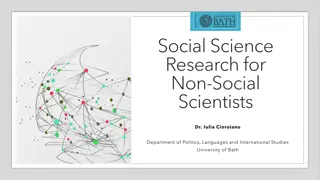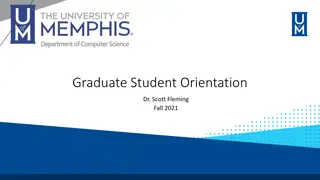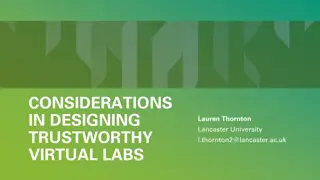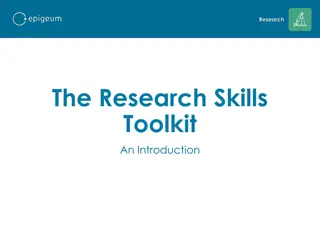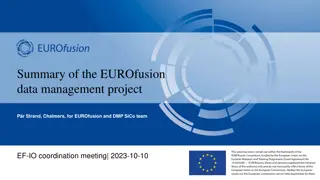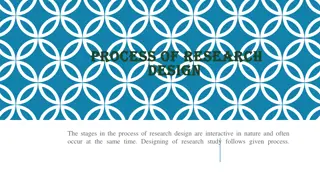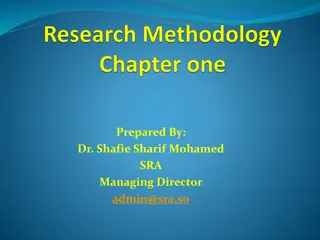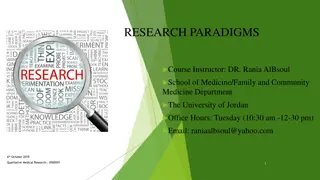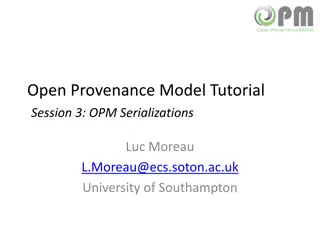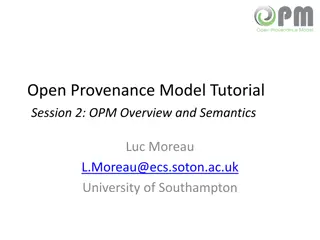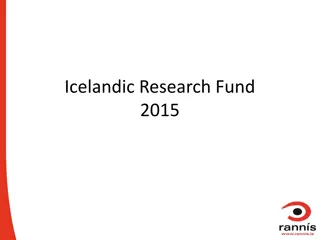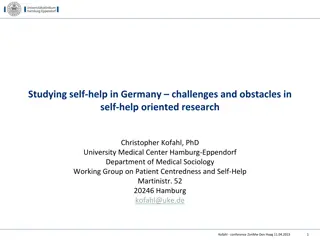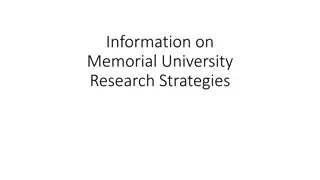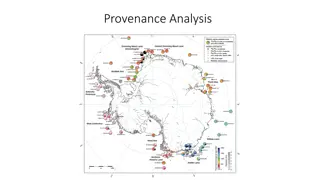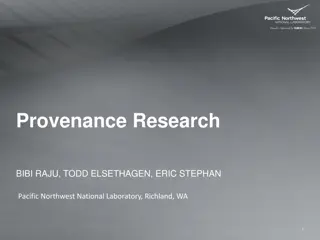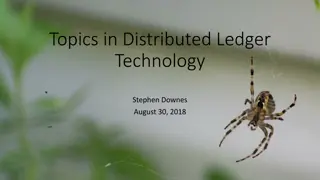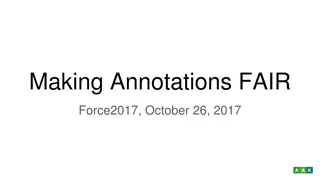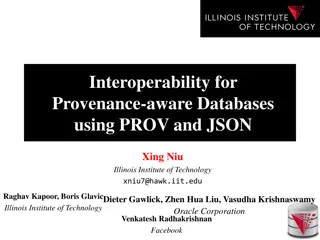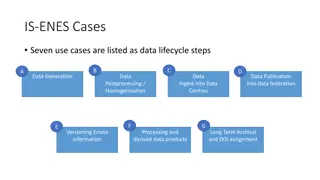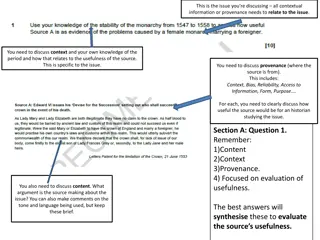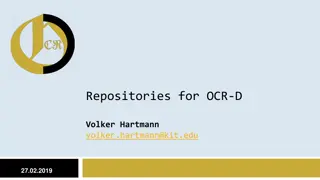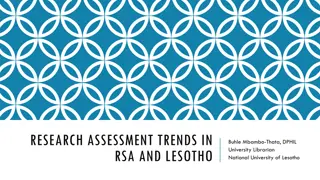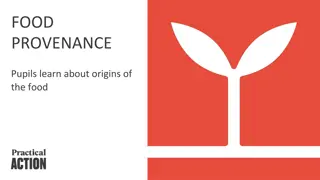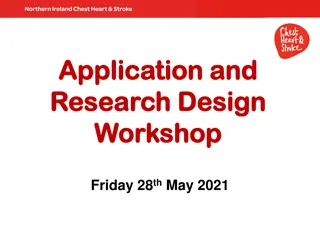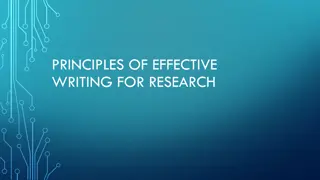Addressing Contemporary Challenges in Research Security Program Development
The Workshop to Inform Development of the Research on Research Security Program (RRSP) focuses on safeguarding the research enterprise amidst evolving global threats. Led by Dr. Rebecca Keiser and Dr. Shawna Cox, the program aims to balance security measures while maintaining an open and collaborati
3 views • 16 slides
Safeguarding Canada's Research: Policy on Sensitive Technology Research and Affiliations of Concern (STRAC)
Canada's new Policy on Sensitive Technology Research and Affiliations of Concern (STRAC) aims to protect the country's research ecosystem from foreign entities posing security risks. The policy restricts funding for projects involving sensitive technology research if affiliated with military or stat
1 views • 10 slides
Understanding the Process and Types of Research Design
The process of research design involves interactive stages that occur simultaneously, leading to the designing of a research study. This includes steps in research design, classification of research design types, such as exploratory, descriptive, and experimental/causal research design. Each type se
12 views • 8 slides
Importance of Formulating Clear Research Problems
Addressing a research problem is crucial in research endeavors as it guides the process, helps in setting objectives, and determines the direction of the study. Formulating a well-defined research problem aids in understanding the research procedure, clarifying objectives, designing the research pro
14 views • 7 slides
Action Research Cycle Step 1: Plan and Implementing Research Questions
Action research involves identifying a problem, forming research questions, and creating a research plan. It aims to understand situations, evaluate, problem-solve, and generate new ideas. Defining a research topic is crucial, focusing on the rationale and relevance. Selecting manageable topics dire
8 views • 17 slides
UCC Research Support and Strategies Overview
UCC's Research Support, Policy & Strategy function, led by David O'Connell, PhD, provides comprehensive support for research activities at the university. The office manages research funding, monitors performance, and facilitates engagement with external stakeholders. UCC's involvement in Horizon Eu
3 views • 17 slides
Understanding Social Science Research for Non-Social Scientists at University of Bath
This resource delves into social science research fundamentals, encompassing types of inquiry, empirical research categories, primary and secondary research distinctions, and the importance of selecting a suitable research topic. It offers guidance on initiating research based on empirical observati
1 views • 10 slides
Graduate Student Orientation Fall 2021 - CS Department Overview
The Graduate Student Orientation for Fall 2021 at the CS Department led by Dr. Scott Fleming covers essential topics such as department mission, degree programs, faculty research areas, research impact indicators, and research opportunities within the department. Learn about the CS Department's high
0 views • 41 slides
Understanding Sediment Provenance in Geology
Sediment provenance in geology involves reconstructing the origin of sediments through compositional analyses to determine erosion history and geographical origins. It helps characterize the journey of sediments from source to sink, providing insights into tectonic and paleoclimatic histories. Prove
1 views • 11 slides
Designing Trustworthy Virtual Labs: Considerations and Reflections
Explore the characteristics and features crucial for designing trustworthy virtual labs, including transparency, provenance, and social aspects. Delve into the importance of trust in digital collaborations and co-productions. Reflect on balancing competing interests and the need for a nuanced approa
0 views • 7 slides
Enhancing Research Skills with Epigeum's Research Skills Toolkit
Epigeum, a leading provider of online courseware, offers the Research Skills Toolkit, comprising five core programs designed to equip postgraduate researchers with key skills and knowledge. Developed from the Research Skills Master Programme, the Toolkit integrates interactive learning design, user-
1 views • 9 slides
Effective Proposal Writing for Health Research
Learn about the fundamentals of research proposals for health-related studies, including defining research, understanding the purposes of health research, and exploring motivation for undertaking research. Discover the difference between basic and applied research, examine types of research, and del
1 views • 70 slides
EUROfusion Data Management Project Summary
EUROfusion data management project led by P. Strand at Chalmers outlines a comprehensive data management plan with four scenarios of increasing ambition, from making metadata available to open access for non-embargoed data. The plan includes strategies for interoperability, data accessibility, enhan
0 views • 11 slides
Overview of Research Problem Identification and Formulation
Understanding the importance of defining a research problem, this content delves into the selection and formulation of research problems, the definition of a research problem, reasons for defining it, methods for identifying research problems, sources of research problems, and considerations in sele
1 views • 11 slides
Understanding the Process and Types of Research Design
The process of research design involves interactive stages occurring simultaneously, leading to the creation of a structured study. There are three main types of research design: exploratory, descriptive, and experimental (or causal). Each type has its own objectives and methods. Exploratory researc
0 views • 7 slides
Understanding the Essence of Research: A Comprehensive Overview
Research is a systematic pursuit of new knowledge, aiming to unveil hidden truths through data collection and analysis. This course outline delves into the fundamentals of research, covering topics such as types of research studies, importance of research, and distinctions between pure and applied r
3 views • 32 slides
Epic Tools for Clinical Research by Shara Power, RN, BSN, OCN
Explore Epic tools for clinical research developed by Shara Power, a skilled application developer specializing in EPIC Beacon Oncology at UIHC Healthcare Information Systems. Learn about managing research study records, investigational study medication orders, and the process for creating and using
0 views • 26 slides
Understanding Research Paradigms in Qualitative Medical Research
Delve into the world of research paradigms in qualitative medical research with a focus on the key differences between objective and subjective research, the meaning of research paradigms, components of research paradigms, types of research paradigms, and how paradigms guide the selection of researc
0 views • 42 slides
Guidelines for Selecting Research Project Topics in Environmental Health
Research is crucial for addressing environmental health issues. Choosing a good research topic is the first step towards effective research. This paper discusses the meaning, characteristics, types of research, and the research process to help in selecting appropriate research topics. Understanding
0 views • 15 slides
Comprehensive Research Training Programme in Social Sciences
Delve into the Research Training Programme offered by the Graduate School of Social Sciences, led by Professor Mark Tranmer. Explore the importance of research methods training, course offerings under the Research Training Programme (RTP), the Certificate in Social Science Research Methods (CSSRM),
6 views • 11 slides
Provenance Analysis of Algorithms - Understanding Data Dependencies
Exploring the concept of provenance analysis in algorithms to understand how output items depend on input items. This analysis goes beyond traditional activity logs, focusing on structured collections of items and exploring various applications for causal and quantitative analysis. The critical test
1 views • 16 slides
Terra Architecture and Design Overview
Terra is a platform driven by the Data Biosphere vision to enable an ecosystem of interoperable components across organizations. It utilizes GA4GH standards and serves various roles such as Biomedical Researchers, Custom Apps & Portals, and Data Developers. The architecture is being restructured to
0 views • 8 slides
Overview of Open Provenance Model Tutorial Session 3
Explore Session 3 of the Open Provenance Model Tutorial, covering topics like the XML Schema for OPM, OWL ontology, OPM Layered Architecture, XML Binding, RDF Binding, and more. Dive into OPM Layered Model, XML Binding, OPM Graph, OPM Process, and OPM Artifact to understand specialized domains and e
0 views • 22 slides
Understanding Open Provenance Model (OPM) in Session 2
Dive into Session 2 of the Open Provenance Model tutorial to grasp the abstract model of OPM, its inferences, and efforts to imbue it with semantics. Explore OPM requirements, non-requirements, domain specialization, and its core layers. Discover how OPM allows for precise exchange of provenance inf
0 views • 51 slides
Icelandic Research Fund 2015: Enhancing Scientific Research and Education
The Icelandic Research Fund (IRF) aims to enhance scientific research and education in Iceland by awarding funding to research projects led by individuals, teams, universities, research institutes, and companies. Principal investigators must have completed graduate studies and experience in running
0 views • 22 slides
Challenges in Self-Help Research in Germany
Exploring the landscape of self-help research in Germany reveals various challenges and obstacles faced by researchers in studying self-help initiatives. The research delves into different aspects such as research scope, involvement of various groups, and the entities conducting research in this dom
0 views • 14 slides
Memorial University Research Strategies Overview
Memorial University's research strategies focus on attracting, retaining, and supporting researchers, fostering an environment of research excellence, engaging with community partners, and supporting fundamental and applied research. The university's strategic priorities include synergy in applicati
0 views • 11 slides
Understanding Sedimentary Rock Characteristics: Provenance and Weathering
Explore the significance of provenance analysis in interpreting the origin of sedimentary rocks based on lithological characteristics. Learn about mechanical and chemical weathering processes, compositional and textural maturity, mineral stability during weathering, and how rock particles indicate t
0 views • 12 slides
Italian Illustrated Editions and Provenance Research Projects
Research projects at Cambridge University Library focused on Italian illustrated editions, bibliophilia, book trade, and provenance information of incunabula. Work involved updating records, organizing provenance data, and collaborating on cultural web portal projects supported by Sapienza Universit
0 views • 7 slides
Enhancing Provenance Research for Reproducibility and Performance
Explore the development of provenance research at the Pacific Northwest National Laboratory, focusing on goals, methodologies, and plans for incorporating time-series metrics to increase scalability and performance. Collaboration with ACME IPPD Panorama is highlighted, showcasing advancements in cap
0 views • 6 slides
Understanding Distributed Ledger Technology Concepts
Distributed Ledger Technology (DLT) involves core concepts like assets, ledgers, transactions, states, conditions, and inferences. It also includes distributed ledgers, cryptographic hash functions, construction of a blockchain, consensus mechanisms like proof of work, and examples of applications s
0 views • 27 slides
The FAIR Principles for Data Management and Stewardship
Embrace the FAIR principles - Findable, Accessible, Interoperable, Re-usable - for effective scientific data management and stewardship. Learn how annotations enhance data FAIRness and the key attributes of each principle. Dive into the high-level guiding principles that ensure data is globally uniq
0 views • 25 slides
Interoperability for Provenance-aware Databases Using PROV and JSON
This research paper discusses the challenges in tracking database provenance and proposes a system, GProM, that computes provenance for database operations. It highlights the importance of exchanging provenance information between systems and the limitations of current relational database systems in
0 views • 28 slides
Challenges in Developing a Coherent Provenance Architecture
In the IS-ENES Cases, challenges arise in establishing a formal model for provenance architecture across various data lifecycle steps. The need for a coherent approach is emphasized to manage provenance information artifacts effectively. These challenges demand the creation of a structured framework
0 views • 11 slides
Evaluating Sources on Female Rule in the 1550s
This analysis focuses on assessing the reliability and usefulness of historical sources discussing the issue of female rule in the 1550s. It evaluates the content, provenance, and context of the sources to determine their relevance for historians studying the topic. The sources provide insights into
0 views • 8 slides
Managing Research Data Repositories for OCR-D
Research data repositories play a crucial role in the OCR-D framework, storing and managing data from document analysis processes. These repositories, like the Ground Truth (GT) repository, support FAIR principles by organizing findable, accessible, and retrievable data with metadata and provenance
0 views • 11 slides
Research Assessment Trends in RSA and Lesotho: Issues, Challenges, and Forward Strategies
Research assessment in RSA and Lesotho involves evaluating research quality, measuring inputs, outputs, and impacts using both qualitative and quantitative methodologies. The prevailing practices include assessing research productivity for progression and utilizing various assessment mechanisms to e
0 views • 7 slides
Understanding Food Provenance and Consumer Awareness
Exploring the importance of food provenance, this article delves into how consumers can learn about the origins of their food and why traceability is crucial. Discover the significance of labels, consumer power, and the impact of imports and exports on the food industry. Gain insights into where our
0 views • 10 slides
Exploring Research Design and Funding Priorities in Northern Ireland
Dive into the world of research at the upcoming Application and Research Design Workshop scheduled for Friday, 28th May 2021. Discover the strategic priorities driving impactful research initiatives, learn about current research projects, funding processes, and collaborations. Explore the rich histo
0 views • 37 slides
Writing Research Papers Effectively: Guidelines and Steps
Effective writing for research involves developing a good research idea, writing a literature review, and understanding the key elements of writing research articles. This process includes coming up with a strong research question, gathering relevant information, creating an outline, writing the dra
0 views • 26 slides






